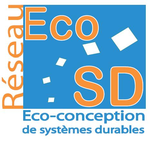|
|
|
Program1. INTRODUCTIONThis first module will introduce complexity in eco-design and a brief presentation of participants’ issues. Participants are asked to prepare 2 slides on the complex system issues they consider to have. 2. ECO-INNOVATION FOR A SUSTAINABLE TRANSITION OF AGRI-FOOD SYSTEMSThe transition towards greater sustainability of food chains introduces many questions about sustainability assessment metrics that can and must be mobilized at different territorial scales to enable the analysis of these socio-technical systems. The diversity of the evaluation axes considered is another specificity of the sustainability analysis for these complex systems. Dr. Gwenola Yannou-Le Bris will illustrate this issue and discuss the co-innovation approaches (including value chain actors and stakeholders) that can be deployed in order to propose spaces for exploring new eco-innovation solutions. 3. DESIGN FOR USER IMPACT
Dr. Yann Leroy & Dr. Flore Vallet will focus on issues dealing with user behaviour modelling and its impact in eco-design, notably through the example of modelling user behaviour in energy systems. 4. LIFE-CYCLE ASSESSMENT OF COMPLEX SYSTEMS
Dr. Yann Leroy and Dr. François Cluzel will make a focus on Life Cycle Assessment (LCA) for complex systems. The challenges are here to define a relevant study perimeter (e.g. functional unit) and to deal with data and life cycle uncertainties. The art of defining probabilized life cycle scenarios is discussed. A short case study will illustrate these issues. 5. SUSTAINABILITY ASSESSMENT FOR THE DESIGN OF COMPLEX SYSTEMS
Dr. Ghada Bouillass will introduce the methodological background of sustainability assessment at different levels and the challenges that raise within its implementation to complex systems. This lecture will allow participants to acquire knowledge on the on-going methodological advances in the field of Life Cycle Sustainability Assessment (LCSA) and Social Life Cycle Assessment (S-LCA) as well as how these methods can be used for designing more sustainable product systems. A workshop is to be conducted to explore through a case study the approaches and to highlight their strenghts and limitations. 6. VALUE ANALYSIS OF COMPLEX SYSTEMS
Dr. François Cluzel will position LCA of complex systems in a more global approach of value analysis to define functions and performances of a system by jointly considering the economic and the environmental dimensions. The module is consist in a workshop based on a case study to test and apply approaches from the literature. 7. ECO-INNOVATION OF COMPLEX SYSTEMSDr. Flore Vallet, Dr. Benjamin Tyl and Dr. François Cluzel will propose a survey on eco-innovation methods and tools. They will highlight the current state of research in this area. Participants will then reflect upon eco-innovation thanks to eco-innovation cases. A focus will be made on the generation of eco-innovative ideas with eco-ideation stimulation mechanisms. 8. VALUE NETWORKS OF COMPLEX SYSTEMS
Dr. Romain Farel will make a lecture on value networks of complex systems. The objective of this workshop is to give the participant a step by step method for designing value chain from scratch for multi-stakeholder industrial systems. 9. ECO-SYNTHESIS OF COMPLEX SYSTEMS
Pr. Pierre-Alain Yvars will propose a half-day module on eco-synthesis of complex systems. The purpose is to show how to take into account early and various types of requirements in the design process of complex systems to allow early system architecture generation and pre-sizing early admissible solutions. The DEPS modeling language will be used for modeling Eco Design Problems. The techniques used for solving are set-based design tools and methods. 10. CIRCULAR ECONOMY AND CIRCULARITY INDICATORS
Dr. Michael Saidani will introduce the challenges of assessing circularity performance at different systemic levels. A newly developed taxonomy of circularity indicators and its associated query tool will be presented and experienced. Through the workshop, several tools aiming at measuring the circularity of materials/products/systems will be applied on a real world industrial case study. Participants will question the strengths, complementary and weaknesses of each approach. 11. LIFE CYCLE ASSESSMENT AND MACHINE LEARNING TOOLS TO DESIGN FOR PRODUCT SUSTAINABILITY
In this newly developed session, Dr Michael Saidani will explore how LCA and ML can be combined to further drive product sustainable design. The approach is illustrated through an hands-on case study on an Amazon Climate Pledge Friendly product and its conventional counterpart. OpenLCA is used for the comparative LCA part, and Jupyter Notebook for the NLP part. Perspectives on how AI can support LCA are also discussed, e.g. to address data deficiencies, scenarios exploration, or impact estimation. 12. RESEARCH WORKSHOP
The participants will be asked to re-analyze their research issues on complex systems to the light of the summer school and the bibliographical material provided. Participants are also asked to propose research leads and a clear roadmap which are discussed by the group and teachers. TEACHING MATERIALAll participants will receive:
|
| Online user: 2 | Privacy |

|

